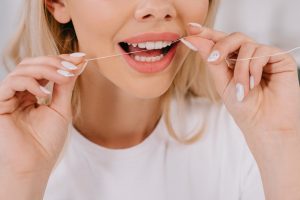
Did you know that approximately 8 percent of people never floss, while 20 percent of people only floss when they feel like they need to or when something is stuck between their teeth? With statistics like that, you may wonder if flossing is really necessary. After all, a significant percent of people have chosen not to adopt this habit. But flossing is important. In this blog post, a preventive dentist discusses just how vital flossing is and provides some tips on how you can make it part of your daily routine.
Brushing Isn’t Enough
Brushing your teeth twice a day is one of the most important steps you can take to prevent dental decay and gum disease. However, brushing by itself does not adequately clean your mouth. Think of it this way: Each tooth has five surfaces above the gumline — the front, the back, the chewing surface, and the two sides that face surrounding teeth. Your toothbrush can easily reach the front, backs, and chewing surfaces of your teeth. However, it may be impossible for the bristles to clean the sides of the teeth. Basically, this means that your toothbrush cannot reach 40 percent of your teeth’s surfaces!
The Consequences of Not Flossing
If you do not floss regularly, plaque and tartar can accumulate in the tight spaces between your teeth. Plaque is a soft, sticky bacterial film that exposes your teeth to acid. It is easy to remove with a toothbrush or floss. However, if plaque remains on your teeth for too long, it hardens into tartar, which is impossible to remove with at-home dental hygiene tools. The longer plaque and tartar sit on your teeth, the greater your risk of developing cavities.
Cavities are not the only risk that comes with inadequate flossing. Oral bacteria may also irritate your gum tissue, causing it to become red and inflamed. This is the first stage of gum disease, which can lead to tooth loss and systemic health problems if it is left untreated.
Not flossing can also have aesthetic consequences. You may have bad breath, and the edges of your teeth may take on a yellowish appearance.
Become a Habitual Flosser
Here are some tips to help you get into the habit of flossing at least once a day:
- Make a group effort. You and your family members can hold each other accountable for your flossing habits.
- Create a visual reminder. Placing the floss somewhere it is easy to see, rather than in a drawer or a medicine cabinet, can remind you to use it.
- Ask for help. Your dentist or dental hygienist can recommend flossing products and give you advice on proper flossing technique.
Do you floss daily? If not, now is the time to get into this smile-saving habit!
About the Author
Dr. Erick Anderson is a general dentist with more than 20 years of experience. He is a Colorado Springs native, and he loves to share his expertise with people in his community. Whether you have questions about oral hygiene or concerns about anything related to your dental health, he is ready to help. Contact our office at 719-593-0988 to learn more about him or to request an appointment.
